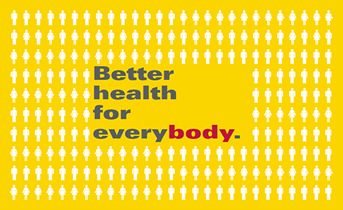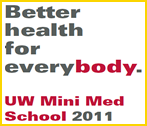 When pain squeezed Mr. Jones’ chest, he didn’t immediately think of a heart attack. He was only 53, a former high school athlete turned Type A chief executive officer for a small company. When the pressure behind his breast bone increased and he broke out in a cold sweat, his wife decided it was time to go the emergency room. An electrocardiogram showed he was having a heart attack.
When pain squeezed Mr. Jones’ chest, he didn’t immediately think of a heart attack. He was only 53, a former high school athlete turned Type A chief executive officer for a small company. When the pressure behind his breast bone increased and he broke out in a cold sweat, his wife decided it was time to go the emergency room. An electrocardiogram showed he was having a heart attack.
“This person has a serious problem,” said Dr. Rick Page, as he welcomed his audience to the University of Wisconsin School of Medicine and Public Health’s first mini medical school. In the next 1 ½ hours, Page, chair of the Department of Medicine, and a cadre of physicians and scientists who help prevent, treat and find new treatments for heart disease followed Mr. Jones through the medical system.
“This is your first day of medical school,” said Page, who shared the duties of mini med “dean” with Craig Kent, MD, chair of surgery. The “students” in his audience learned that an adult dose of aspirin given during a heart attack reduces death by 50 percent and watched stents open arteries, restoring heart flow to the heart and the brain. They saw beating heart cells that had been grown from stem cells and learned about clinical trials using stem cells to regrow blood vessels to restore circulation to limbs.
“You now know how to prevent and how to treat complicated cardiovascular disease,” Page told his “students” as the class concluded. “You have seen a glimpse of the future for cardiac and vascular disease.”
Second mini med explores breast cancer
The mini medical school reconvenes June 20, when physicians and scientists will follow a patient with breast cancer, from diagnosis through treatment, while exploring the latest therapies and promising research. Many of the presenters are members of the University of Wisconsin Carbone Cancer Center.
Following are the June 20 mini med faculty:
- Lee Wilke, MD, director UW Health Breast Center, will introduce Mrs. Johnson, a 65-year-old, healthy woman whose mammogram shows a density in her left breast. In the clinic, Wilke specializes in breast cancer. Her principal research interest is in clinical trials seeking new methods to treat breast cancer. She is among the investigators evaluating the use of optical spectroscopy to evaluate the margins of breast tumors.
- Andreas Friedl, MD, director of surgical pathology, examines whether a hybrid molecule called heparin sulfate proinvestigates plays a key role in cancer growth, invasion and the growth of blood vessels.
- Mark Burkard, MD, PhD, lead, Breast Cancer Disease Oriented Working Group, is interested in therapies targeted at how proteins interact. He hopes to link therapies with targets inside cancer cells through genetics and identify those patients most likely to benefit from particular drugs.
- David Beebe, PhD, associate chair of research, Biomedical Engineering, explores new ways to understand cell behavior to provide biological insights, aid in diagnosis and treatment, and enhance discovery. His lab explores how to engineer in vitro microenvironments to probe the nature of cell interactions that regulate cell behavior, particularly as they relate to cancer biology.
- Elizabeth Burnside, MD, MPH, vice chair of research, Department of Radiology, is interested in improving early detection of breast cancer. With combined medical and public health degrees, she is especially interested in using artificial intelligence to improve breast imaging in the pursuit of improving population-based screening and diagnosis of breast cancer. Her multidisciplinary research is facilitated by affiliate appointments in the departments of Industrial Engineering, Biostatistics and Medical Informatics and Population Health Science.
- Steven Howard, MD, PhD, radiation oncologist, School of Medicine and Public Health, has worked to minimize the dosage needed for radiation therapy to improve patient well-being.
- Kevin Eliceiri, MS, director of the Laboratory for Optical and Computational Instrumentation, is an internationally-known expert in advanced light microscopy. His research includes finding non-invasive imaging approaches for cancer and improving live-cell imaging.
- Kent and Page return as emcees for the second mini med school.

UW Mini Med School – 2011
- Your Heart: A User’s Manual – April 7, 2011
- Breast Cancer: What Women (and Men) Should Know – June 20, 2011
- Bones and Back – September 14, 2011
These events are open to the public and admission is free, but please register with Melissa Boyd at 608-265-4689.
